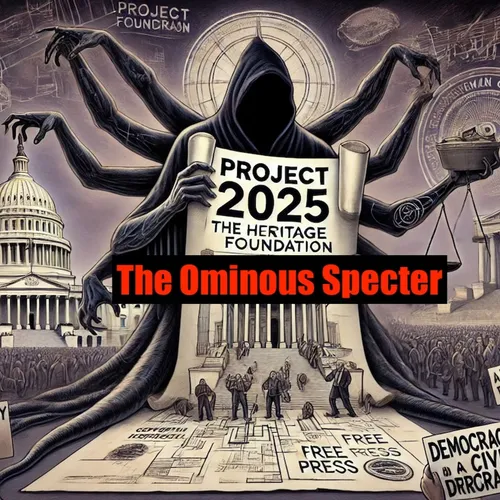"Unveiling Project 2025: A Comprehensive Plan to Reshape American Governance"
- Author
- Quiet.Please
- Published
- Tue 18 Mar 2025
- Episode Link
- https://www.spreaker.com/episode/unveiling-project-2025-a-comprehensive-plan-to-reshape-american-governance--64961177
As I delved into the intricacies of Project 2025, a blueprint crafted by the Heritage Foundation for a potential second Donald Trump presidency, I was struck by the sheer scope and ambition of its proposals. This 900-page document is more than just a policy guide; it is a comprehensive plan to reshape the very fabric of American governance.
At its core, Project 2025 aims to centralize power in the White House, leveraging the unitary executive theory to expand presidential control over the federal government. This vision is championed by conservative legal scholars and has been embraced by the Supreme Court in recent years. As Kevin Roberts, a key figure in the project, put it, "all federal employees should answer to the president," reflecting a desire to eliminate the independence of agencies like the Department of Justice (DOJ), the Federal Bureau of Investigation (FBI), and the Federal Communications Commission (FCC)[1].
One of the most contentious aspects of Project 2025 is its proposal to reinstate Schedule F, an executive order issued by Trump in October 2020 that was later rescinded by President Biden. Schedule F would strip career government employees of their employment protections, allowing the president to fire and replace them with loyalists and ideologues. This move would fundamentally alter the civil service system, which has been merit-based since the Pendleton Act of 1883. As the American Federation of Government Employees (AFGE) Public Policy Director Jacque Simon warned, "If all of their recommendations were implemented, it wouldn’t just eviscerate our statutory collective bargaining rights and pay system but undo the basics of the apolitical, merit-based system we have today"[5].
The implications of Schedule F are far-reaching. It would enable the president to reward cronies and punish enemies, creating an environment ripe for corruption and abuse of power. Independent agencies, which currently provide crucial oversight and accountability, would be rendered ineffective. This could lead to a chilling effect where government employees are discouraged from speaking out, and agencies might be incentivized to suppress the truth and spread misinformation[2].
Project 2025 also outlines drastic changes to various federal agencies. The Department of Homeland Security (DHS), created in response to the 9/11 terrorist attacks, would be eliminated, and the Transportation Security Administration (TSA) would be privatized. This move would revert the country to a pre-9/11 era, potentially compromising national security efforts and intelligence sharing. The Department of Education would be dismantled, with oversight and federal funding for education handed over to the states, a change that could severely impact Title I funding for high-poverty schools and exacerbate existing teacher shortages[5][3].
The Department of Justice, under Project 2025, would undergo significant reforms. The DOJ would be tasked with combating "affirmative discrimination" or "anti-white racism," and its Civil Rights Division would prosecute state and local governments, institutions of higher education, and private employers with diversity, equity, and inclusion (DEI) or affirmative action programs. Gene Hamilton, a former Trump DOJ official, argued that advancing the interests of certain segments of American society comes at the expense of others and violates federal law. This approach would fundamentally alter the DOJ's role in protecting civil rights, instead aligning it with a conservative agenda[1].
In the realm of public education, Project 2025's proposals are equally alarming. The plan would eliminate Title I funding, which has been critical for high-poverty schools since 1965, and replace it with no-strings-attached block grants to states. This change could lead to significant budget strains for already underfunded schools, undermining academic outcomes for millions of...
